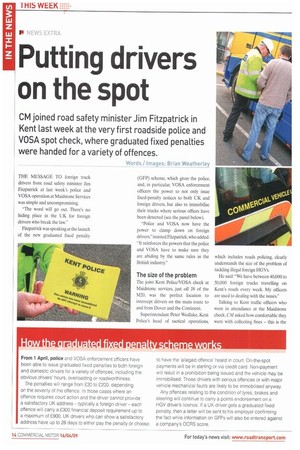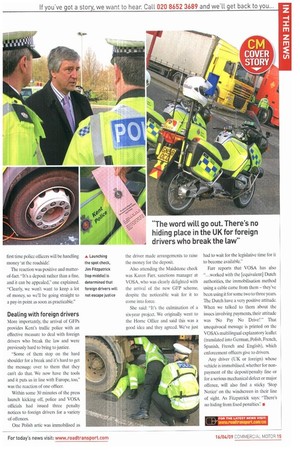Putting drivers on the spot
Page 14

Page 15

If you've noticed an error in this article please click here to report it so we can fix it.
CM joined road safety minister Jim Fitzpatrick in Kent last week at the very first roadside police and VOSA spot check, where graduated fixed penalties were handed for a variety of offences.
Words / Images: Brian Weathertey THE MESSAGE TO foreign truck drivers from road safety minister Jim Fitzpatrick at last week's police and VOSA operation at Maidstone Services was simple and uncompromising.
"The word will go out. There's no hiding place in the UK for foreign drivers who break the law."
Fitzpatrick was speaking at the launch of the new graduated fixed penalty (GFP) scheme, which gives the police, and, in particular, VOSA enforcement officers the power to not only issue fixed-penalty notices to both UK and foreign drivers, but also to immobilise their trucks where serious offices have been detected (see the panel below).
"Police and VOSA now have the power to clamp down on foreign drivers," insisted Fitzpatrick, who added: "It reinforces the powers that the police and VOSA have to make sure they arc abiding by the same rules as the British industry."
The size of the problem
The joint Kent Police/VOSA check at Maidstone services, just off 78 of the M20. was the perfect location to intercept drivers on the main route to and from Dover and the Continent.
Superintendant Peter Wedlake. Kent Police's head of tactical operations, which includes roads policing, clearly understands the size of the problem of tackling illegal foreign HGVs.
He said: "We have between 40,000 to 50,000 foreign trucks travelling on Kent's roads every week. My officers are used to dealing with the issues" Talking to Kent traffic officers who were in attendance at the Maidstone check, CM asked how comfortable they were with collecting fines — this is the first time police officers will be handling money *at the roadside: The reaction was positive and matterof-fact. "It's a deposit rather than a fine, and it can be appealed," one explained. "Clearly, we won't want to keep a lot of money, so we'll be going straight to a pay-in point as soon as practicable."
Dealing with foreign drivers More importantly, the arrival of GI-Ps provides Kent's traffic police with an effective measure to deal with foreign drivers who break the law and were previously hard to bring to justice.
"Some of them stop on the hard shoulder for a break and it's hard to get the message over to them that they can't do that. We now have the tools and it puts us in line with Europe, too," was the reaction of one officer.
Within some 30 minutes of the press launch kicking off, police and VOSA officials had issued three penalty notices to foreign drivers for a variety of offences.
One Polish artic was immobilised as the driver made arrangements to raise the money for the deposit.
Also attending the Maidstone check was Karen Farr, sanctions manager at VOSA, who was clearly delighted with the arrival of the new GFP scheme, despite the noticeable wait for it to come into force.
She said: "It's the culmination of a six-year project. We originally went to the Home Office and said this was a good idea and they agreed. We've just had to wait for the legislative time for it to become available."
Farr reports that VOSA has also "...worked with the [equivalent] Dutch authorities, the immobilisation method using a cable came from them — they've been using it for some two to three years. The Dutch have a very positive attitude. When we talked to them about the issues involving payments, their attitude was 'No Pay No Drive!" That unequivocal message is printed on the VOSA:s multilingual explanatory leaflet (translated into German, Polish, French, Spanish, French and English), which enforcement officers give to drivers.
Any driver (UK or foreign) whose vehicle is immobilised, whether for nonpayment of the deposit/penalty fine or for a serious mechanical defect or major offence, will also find a sticky 'Stop Notice' on the windscreen in their line of sight. As Fitzpatrick says: "There's no hiding from fixed penalties': •








































































































































